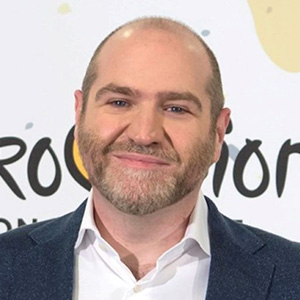Israel wins 63rd Eurovision Song Contest
12 May 2018Israel has won the 63rd Eurovision Song Contest with the song "Toy” performed by Netta. It's the 4th win for Israel who triumphed in 1978, 1979 and 1998.
26 countries took part in the Grand Final of the world’s longest running annual television music competition, hosted by Rádio e Televisão de Portugal (RTP) on Saturday 12 May in Lisbon, Portugal.
Doran Medalie and Stav Beger wrote the winning song which finished the night with 529 points, 93 points ahead of 2nd placed Cyprus represented by Eleni Foureira singing "Fuego". Austria's Cesar Sampson with "Nobody But You finished in third place.
On winning Netta said: "Thanks for celebrating differences between us – thanks for celebrating diversity."
Following the performances of the 26 Grand Finalists, the results of the juries in the 43 participating nations who voted on Friday’s dress rehearsal were given out leaving Austria in the lead.
This was followed by an exciting, tense sequence where viewers’ televotes for each competing country were combined and added to the scoreboard resulting in a thrilling finale that saw Israel score the most televotes to be declared the winner.
An estimated audience of 200 million will have seen this year's Contest which was broadcast live in the 43 participating countries and in Kazakhstan and Kosovo.
Viewers in the United States also saw the Grand Final live for the third year running on LogoTV.
The 26 finalists performed live in front of an audience of 11,500 inside the Altice Arena in the Portuguese capital. In total, 43 EBU Members competed in this year’s Eurovision Song Contest. 17 nations were knocked out in two Semi-Finals held on 8 and 10 May.
Jon Ola Sand, the EBU's Head of Live Events and Executive Supervisor of the ESC, said: "The EBU has been delighted with this year’s competition. In what has been a landmark year, with it being our first in Portugal and a record equalling number of participants, there couldn’t have been a better time for Lisbon to be the host city for Eurovision. The Contest’s ability to unite and entertain people around the world, a hallmark of public service media, has never been more important and the performance tonight from Israel showed this by captivating both the audience in the arena and at home.”
“We now look to the future and to 2019. With our next host broadcaster KAN we will work to produce another stand out show, that will continue to highlight the importance of the Eurovision Song Contest in the modern media landscape”.
The Grand Final was also a showcase for Portuguese music with a world exclusive of traditional Fado artists Ana Moura and Mariza performing together for the first time ever in a mesmerizing opening segment.
EBU Media Director Jean Philip De Tender said about the event: “This year’s Eurovision Song Contest has shown the power of public service media to create shared experiences that millions of viewers in over 40 countries can enjoy together. We are so proud of our team in Lisbon for delivering 3 incredible shows this week and look forward to begin planning next year’s competition in Israel.”
Over 1,100 people, from Portugal and 19 other countries worked on producing this year's Contest. 30 cameras, 232 microphones and 2632 lighting fixtures were used on the production.
Around 1,400 journalists from 80 countries were also in the host city Lisbon to cover the event.
The 63rd Eurovision Song Contest was broadcast live in the 43 participating countries by EBU Members: ORF (Austria), PTV (Armenia), RTSH (Albania), ICTIMAI (Azerbaijan), BTRC (Belarus), VRT (Belgium), RTBF (Belgium), BNT (Bulgaria), HRT (Croatia), CyBC (Cyprus), ČT (Czech Republic), DR (Denmark), ERR (Estonia), YLE (Finland), GPB (Georgia), ARD (Germany), ERT (Greece), MTV (Hungary), RÚV (Iceland), RTÉ (Ireland), KAN (Israel), RAI (Italy), LTV (Latvia), LRT (Lithuania), RTCG (Montenegro), MRT (FYR Macedonia), PBS (Malta), TRM (Moldova), RTCG (Montenegro), AVROTROS (The Netherlands), NRK (Norway), TVP (Poland), RTP (Portugal), TVR (Romania), Channel One (Russia), SMRTV (San Marino), RTS (Serbia), RTVSLO (Slovenia), RTVE (Spain), SVT (Sweden), SRG SSR (Switzerland), UA:PBC (Ukraine), BBC (United Kingdom) and Associate Member SBS (Australia).
13 EBU Radio Members broadcast the Grand Final live: ERR (Estonia), Radio France (France), NDR, WDR (Germany), RTÉ (Ireland), RAI (Italy), LR (Latvia), RTVS (Slovakia), RTVSlo (Slovenia), RS (Serbia), SR (Sweden), UA:PBC (Ukraine), and the BBC (United Kingdom).
The 2018 Eurovision Song Contest was a co-production between the European Broadcasting Union (EBU) and RTP.
The full list and profiles of participants for the 2018 Eurovision Song Contest, with high resolution photos, can be found on the official website, Eurovision.tv.
Relevant links and documents
Contact

Dave Goodman
Digital and Communications Manager - Eurovision Song Contest and Junior Eurovision Song Contest

